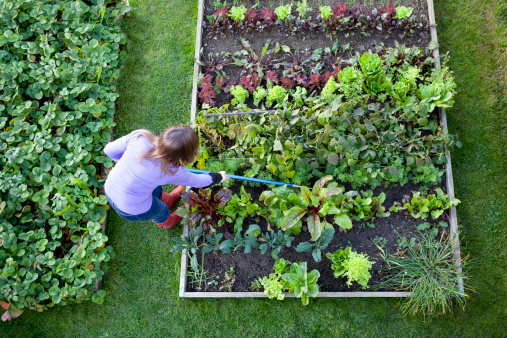One thing that often surprises people new to gardening, is just how much thought you have to put into watering your plants to get the best results (that’s where an automatic garden hose reel can save you time and effort). But, it’s not just a case of ‘one size fits all’ when it comes to watering your garden, and there are a whole host of factors that have to come into play if you want to get the most out of your plants.
Another thing I get asked quite frequently is ‘how often should I water a raised garden bed?’, and again, the answer isn’t that simple or straightforward, so I thought I’d put this little guide together in the hopes of covering as many of the variables as I can.
As a rule of thumb though, raised beds tend to need watering more often than ones planted into the ground due to the better drainage the raised beds offer, and the fact that plants grown this way tend to grow at a faster rate.
What type of soil do you have in your raised beds?
The type of soil will play apart in how often you should water your raised beds. This is because different soils interact with water in different ways.
Clay soil, for example, retains moisture really well, but doesn’t drain as well as some other types and so will probably need watering less. Sandy soils offer great drainage, but water passes through quickly and this might not be ideal for some plants.
If your soil is not ideal, you can add compost or manure to alter its properties. We have articles on these very subjects right here on this site, so be sure to check them out. Knowing what soil you have is a good first step to understanding how often you should water your raised beds.
What season is it?
It should come as no surprise that the changing of the seasons will also alter your watering schedule. Generally speaking, you will be watering about three times more often in the summer than in autumn and winter, but with the British climate becoming ever more unpredictable, this may change from time to time. For example, if there is a sudden heat wave in Spring, or a week of plunging temperatures in the middle of summer.
In Autumn and Winter, there tends to be a lot more rainfall so you’ll water the raised beds less often, but don’t make the mistake of thinking mother nature is taking care of everything for you. Not all that rainwater will be absorbed by the plants due to run-off and evaporation, so I would still do a soil check to see if your hand is needed.
Overwatering in winter is a big mistake as the cold can cause freezing and damage your plants.
Does the soil need watering?
If you’re really not sure whether the soil in your raised beds needs watering, you can always do a simple check with your own bare hands. On a day that has average temperatures, sink your finger into the soil to see if it feels spongy or dry. The former is good, the latter means you need to water. I would recommend doing checks like this: one at 1-inch depth, one at 3 inches, and another at 6 inches, to make sure the moisture is getting down towards the roots of your plants.
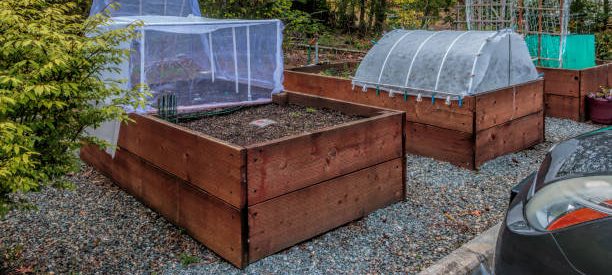
A more accurate way to test the moisture levels in your soil is to set up a rain gauge. These can be simple plastic models, available for a few pounds, or you could pay around 30 pounds for a digital one with extra features such as temperature display.
What stage are your plants at?
The growth stage of your plants will determine how much water they need. For seeds and seedlings, you’re going to have to be out there with your watering can every day.
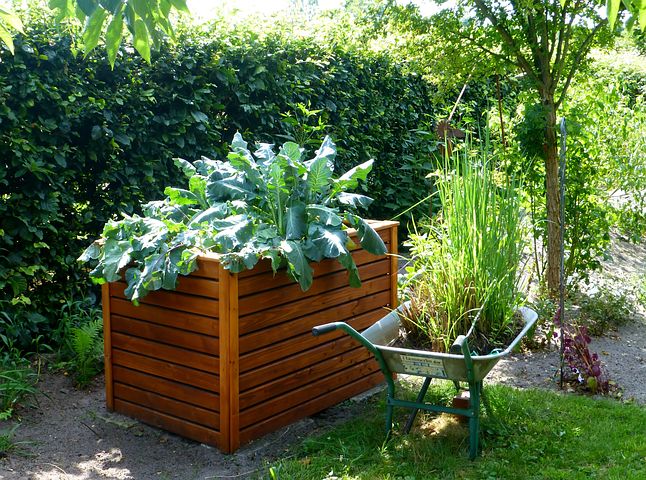
The soil in your raised beds will need to be kept moist in order for the seeds and seedlings to grow and become established, but be careful not to overwater at this stage, or it can have the opposite effect to what you are trying to achieve.
Once the plants are established and producing flowers and fruit, you can reduce the frequency of your watering schedule, but you also need to change the way you water the plants too. Established plants need water to get down to their roots, so watering less frequently, but watering deeply, is usually best. However, some plants might require something more specific, so this is only a generalisation and you should research the plants and crops you are growing so as to know what is best for them.
What time of day are you watering?
The ideal time to water your plants, especially vegetable crops, is early in the morning before the sunlight can start to evaporate the moisture. Watering at this time gives your plants a great start to the day, and doing so regularly will deliver healthy looking raised beds.
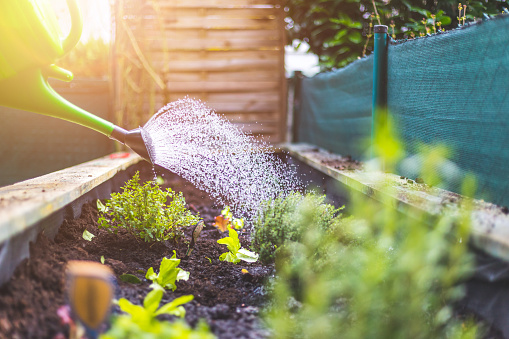
Watering midday is best avoided if possible, because of rapid evaporation, but later in the afternoon, around 4pm or later, is another great time to water your raised beds. At this time, there is still some sunlight left, but it is not intense and will give the plants time to take a hearty drink.
Obviously, in winter the sun goes down a lot earlier, and you’ll be watering less anyway, so adjustments have to be made.
How have you planted your raised beds?
By this, I mean how intensely have you planted in your beds? If your plants or crops are spaced far apart, you’ll probably need to water them more than if they were more intensely packed in.
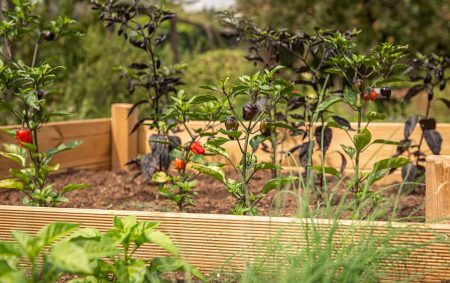
The reason for this is that the plants foliage will create natural shade, and this can slow down and reduce evaporation of moisture. With this in mind, the type and size of the leaves on your plants can also have an effect in this area.
You might find that the plants on the edges of your beds tend to dry out at a much faster rate than the ones located in the centre, so be sure to keep an eye on this and adjust your watering as needed.
If your chosen plants need more space to grow properly, and crowding isn’t possible, you should try your best to keep the soil moist by adding compost or mulch to help retain water.
How are you watering your raised beds?
Your watering method can affect how often you should water your raised beds too. Watering using a watering can, normal sprinkler system, drip irrigation system, or micro-irrigations system, will all be a little different, with some being more efficient than others.
If you are interested in buying a soaker hose, drip irrigation system, or water timer system, you should check out our excellent review pages where we test the latest and most popular products to see if they live up to the hype or not.
Well, that should cover most of the things you need to know when working out how often to water your raised beds.
As you can see, it is more personal than you might have expected and what is good for one person, might not be the best for someone else. Take the above factors into consideration, use a bit of common sense, and you’ll soon have raised beds flourishing with wonderful plants.
